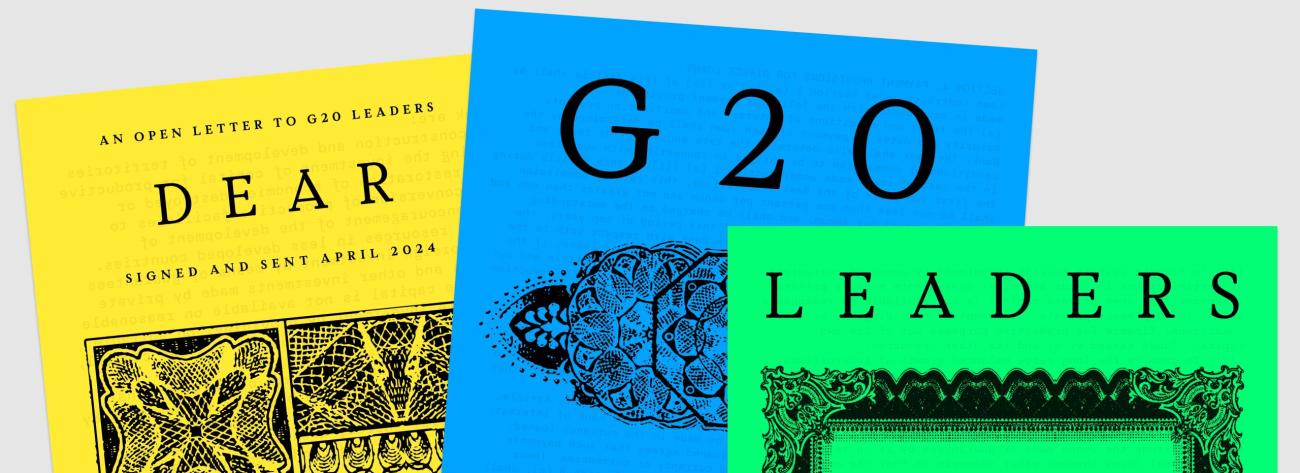80 years ago the institutions that govern the world’s economies were created: the International Monetary Fund (IMF) and the World Bank. In the wake of World War II, they were devised as a means for lasting peace and prosperity but today they are not living up to this ideal.
80 years on, an unprecedented coalition of leading actors, politicians, artists and economists have written to the leaders of these major economies – the G20 – urging them to upgrade the financial system to help solve the debt and climate crises and achieve the Sustainable Development Goals.
Why Now?
Building on calls for global public finance reform led by Barbados Prime Minister Mia Mottley, Kenyan Prime Minister William Ruto, and French President Emmanuel Macron, the letter has been published on the eve of the Spring Meetings of the IMF and World Bank – which will see decisionmakers gather in Washington DC.
As we move into the Second Half of the Global Goals, now is the time for decisive action. Reform of the global financial architecture and the replenishment of these iconic institutions holds the potential to be a game-changer for all the goals – so that by 2030 we see true progress across climate, poverty, gender inequality, and many more of the world’s most pressing issues.
What Is the Open Letter Asking For?
Backed by ex-world leaders; global artists and activists; the CEOs of major International NGOs Oxfam, Save The Children, Christian Aid, The ONE Campaign, The International Rescue Committee; and many more – the letter has three clear asks:



Triple The Investment
To achieve the Global Goals and meet the commitments of the Paris Agreement by 2030, it’s estimated that we need to invest at least $5.4 trillion annually. Right now, we’re falling short by about $3 trillion each year.
Multilateral development banks play a pivotal role in financing both climate action and broader development initiatives, but they must triple their lending levels by the end of this decade if we are to create a more sustainable and equitable world for all. This includes a tripling of the funding provided by the World Bank’s International Development Association (IDA) which is one of the largest sources of affordable financing for low-income countries. To find out more about how investing in funds like IDA can deliver smart, long-term wins for all of us, watch this short film.
End Crippling Debt
The burden of international debt is severely hampering the progress of developing and emerging economies. Low-income countries in particular find themselves trapped in a cycle of repayments to wealthier countries, the World Bank and the IMF. This puts 60% of low-income countries and at least 25% of middle-income countries at risk of being unable to fulfil their repayment obligations.
Currently, low-income countries spend 2.5 times more on debt than on education, 4 times more than on health, 5 times more than on climate change initiatives, and a staggering 11 times more than on social protection. By alleviating debt in these countries, we can empower them to redirect their scarce resources from debt repayments to human development and climate adaptation.
Make Polluters Pay
Addressing climate change and global inequalities requires holding major polluters accountable. The bitter reality is that the wealthiest individuals are significant contributors to global carbon emissions by leading carbon-intensive lifestyles. In 2019, the richest 1% were responsible for as much carbon output as the poorest 66% of the global population.
Meanwhile fossil fuel companies, responsible for 70% of global industrial emissions, continue to bring in record profits while benefiting from substantial subsidies. In 2022, UN Secretary General Antonio Guterres criticised this imbalance and suggested redirecting these funds to support those most affected by climate change.
Making polluters pay would free up vast sums of money needed to achieve the Global Goals. By simply implementing taxes on the wealth and income of the 1% we could generate over $1.7 trillion annually.
Take Action
We want to make sure that the letter reaches as many G20 Leaders as possible! Will you help us? Read and share the full letter, using our simple toolkit, and visitglobalgoals.org/dearG20to take further action with Global Citizen and Oxfam. With your help, we can pave the way for a brighter tomorrow.
**This article first appeared on The Global Goals.








